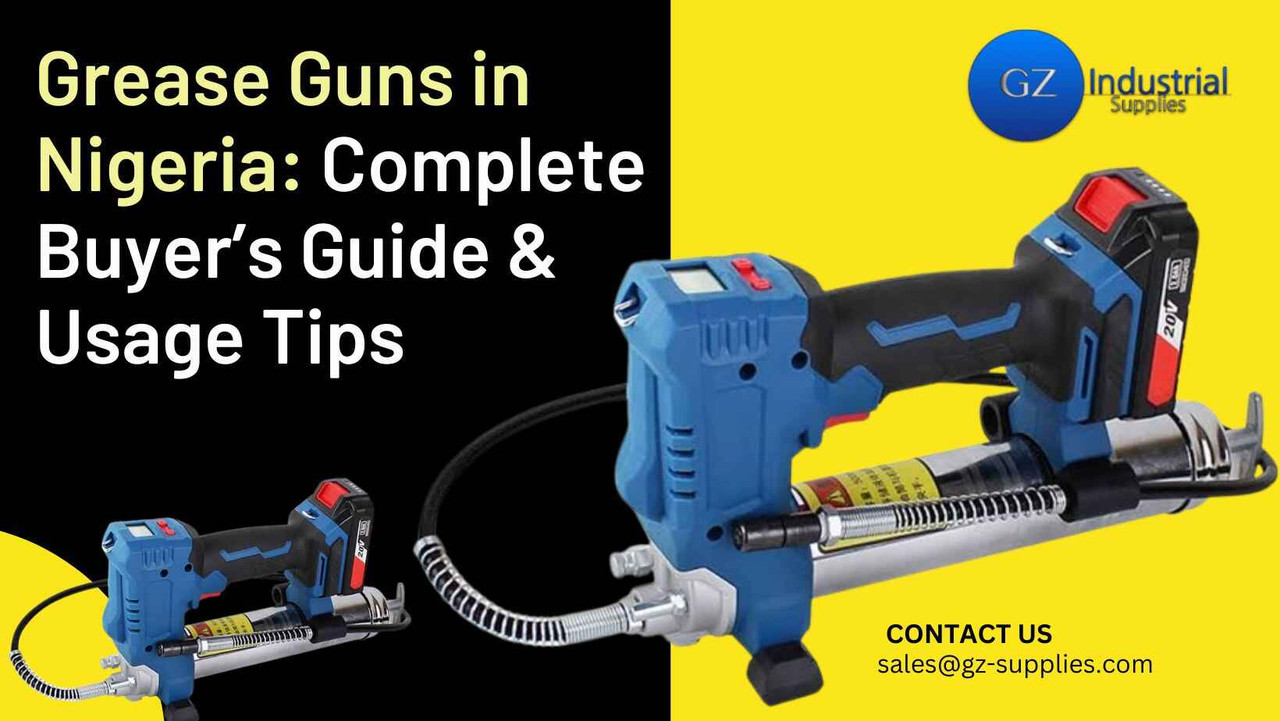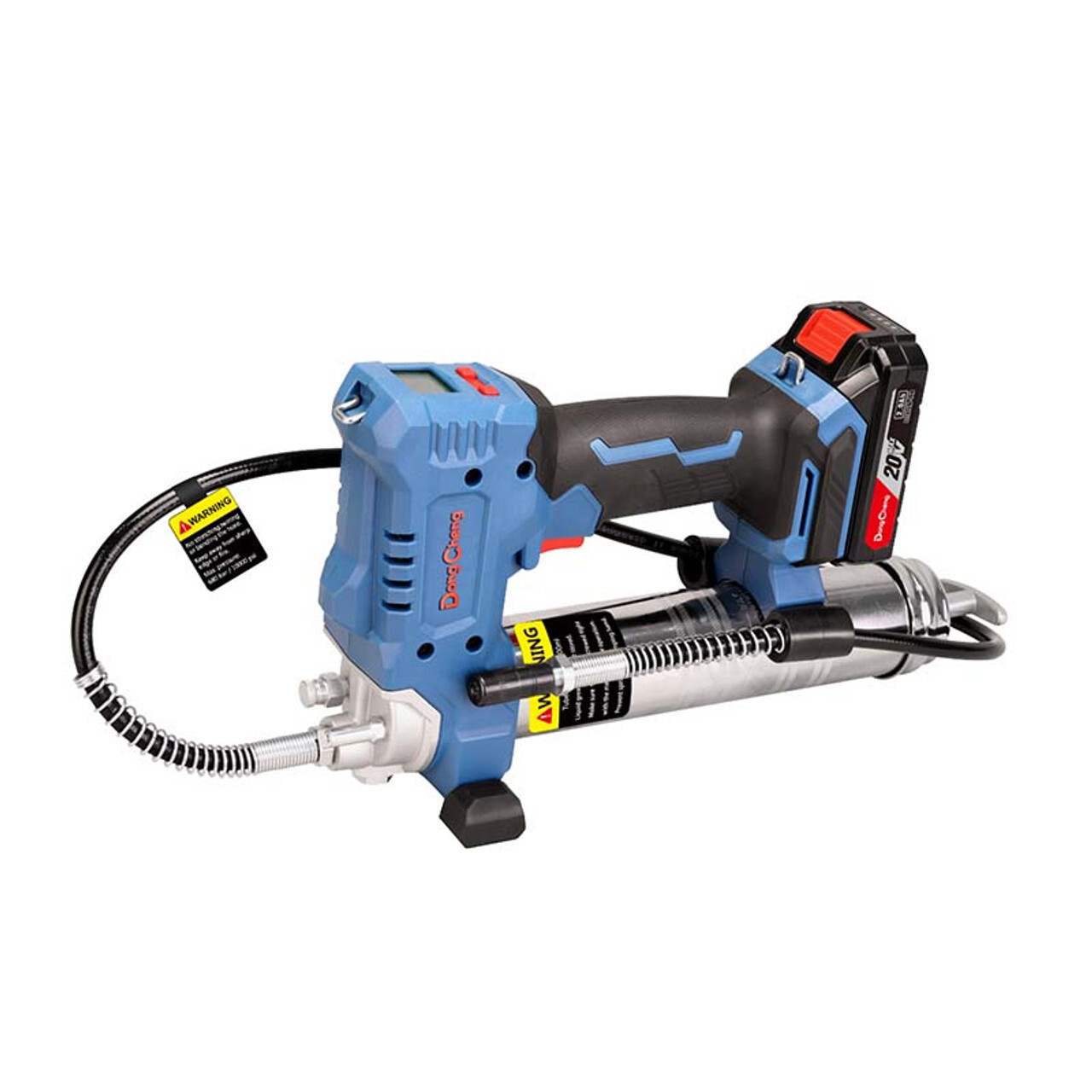Grease Guns in Nigeria: Complete Buyer’s Guide & Usage Tips
Introduction
In industries where machinery is constantly moving, lifting, spinning, or vibrating, lubrication is life and the grease gun is the tool that delivers it. From automotive workshops in Lagos to industrial plants in Port Harcourt, grease guns are a staple for precision lubrication in maintenance routines.
But not all grease guns are created equal. Whether you’re a mechanic, maintenance engineer, or equipment owner, understanding the types, grease compatibility, and usage techniques will help you extend your equipment’s life, reduce downtime, and improve safety.
At GZ Industrial Supplies, we supply a wide range of manual, pneumatic, and battery-powered grease guns, as well as grease couplers, cartridges, and accessories designed for Nigerian working conditions. This comprehensive guide will help you choose the right grease gun for your needs and show you how to use and maintain it effectively.
Key Takeaway
- Grease Guns Are Essential for Industrial Maintenance: They ensure proper lubrication of heavy machinery, reducing friction, wear, and costly breakdowns.
- Know the Types Before Buying: Nigeria’s market offers manual, pneumatic, and battery-powered grease guns. Choose based on your workload, budget, and usage frequency.
- Use the Right Grease for the Job: Always match the grease type with equipment requirements to avoid damage, contamination, or inefficiency.
- Routine Maintenance Maximizes Performance: Regularly clean, inspect, and store your grease gun properly to extend its lifespan and ensure consistent functionality.
What Is a Grease Gun?
A grease gun is a handheld tool used to inject grease into mechanical parts through fittings (commonly called zerk or grease nipples). It’s designed to apply just the right amount of lubricant to friction points like bearings, joints, and bushings reducing wear, heat, and corrosion.
How It Works:
- A trigger or lever pressurizes the grease
- The grease is pushed through a flexible hose or rigid pipe
- It exits through a coupler that locks onto the grease fitting
- The lubricant flows into tight mechanical spaces without disassembly
Used properly, grease guns prevent costly failures in trucks, generators, conveyors, compressors, and other high-demand equipment.
Learn more:Types of Grease to Use on a Grease Gun
Types of Grease Guns (With Pros & Cons)
Choosing the right type of grease gun depends on your application, grease volume needs, and budget. Here’s a breakdown of the four main types:
Manual Lever Grease Gun
- Operation: Hand-pumped using a lever
- Best For: General-purpose maintenance
- Pros: Inexpensive, widely available, simple to use
- Cons: Requires two hands and effort; slow for large jobs
Pistol Grip Grease Gun
- Operation: One-handed trigger mechanism
- Best For: Automotive shops, mobile repairs
- Pros: Easier to control; suitable for tight spaces
- Cons: Less grease output per pump
Pneumatic (Air-Powered) Grease Gun
- Operation: Uses compressed air to drive grease
- Best For: High-volume, continuous use in factories
- Pros: Fast and powerful; reduces hand fatigue
- Cons: Requires air compressor; higher cost
Battery-Operated (Cordless) Grease Gun
- Operation: Electric motor powered by rechargeable battery
- Best For: Fieldwork, agricultural, and heavy equipment
- Pros: Maximum portability and speed
- Cons: Expensive; requires charging and maintenance
Tip: If you're unsure, start with a pistol grip grease gun for general use, it offers the best balance of control and convenience.
Learn more: Manual vs Pneumatic vs Battery-Powered Grease Guns: Which Is Best for You?
Types of Grease Used in Grease Guns
Choosing the right grease is just as important as choosing the right grease gun. Different types of grease have different viscosities, additives, and temperature tolerances—and using the wrong one can lead to equipment damage or lubrication failure.
Here are the most common greases used in grease guns:
Lithium-Based Grease
- Use: General-purpose lubrication
- Properties: Water-resistant, good mechanical stability, high temperature tolerance
- Applications: Bearings, chassis, universal joints
Calcium-Based Grease
- Use: Marine and humid environments
- Properties: Excellent water resistance, poor high-temperature resistance
- Applications: Boat trailers, agricultural equipment
Molybdenum (Moly) Grease
- Use: High-pressure points and extreme conditions
- Properties: Contains molybdenum disulfide for anti-wear under heavy loads
- Applications: Construction equipment, CV joints, heavy-duty trucks
Polyurea Grease
- Use: Long-life applications
- Properties: Oxidation-resistant, wide temperature range, non-soap base
- Applications: Electric motors, sealed bearings
Learn more: Common Grease Gun Problems and How to Fix Them
Compatibility Tip:
Not all greases are compatible. Mixing incompatible greases can lead to thickening, thinning, or breakdown, reducing lubrication effectiveness.
|
Grease Type |
Compatible With |
Avoid Mixing With |
|
Lithium |
Lithium Complex, Calcium |
Polyurea, Clay-based |
|
Calcium |
Lithium, Aluminum |
Polyurea |
|
Moly |
Same base (e.g., Lithium) |
Polyurea, incompatible bases |
|
Polyurea |
Itself |
All other grease types |
Key Applications of Grease Guns in Nigeria
Grease guns are widely used in Nigerian industries where reliable lubrication is critical for uptime and efficiency.
Top Use Cases Include:
- Automotive Workshops – Suspension systems, wheel bearings, U-joints
- Heavy Equipment Maintenance – Excavators, bulldozers, compactors
- Power Generators & Compressors – Shaft bearings, motors
- Marine & Offshore – Winches, gearboxes, water-resistant points
- Agriculture & Construction – Tractors, implements, joints
- Food Processing – With food-grade grease (where required)
Proper lubrication with the right grease gun reduces:
- Friction and wear
- Heat and noise
- Downtime and costly part replacements
Learn more:Grease Couplers: Types, Uses and How to Choose
How to Load and Use a Grease Gun Properly
Using a grease gun isn't complicated but using it correctly makes the job cleaner, faster, and more effective.
Loading a Grease Gun (Cartridge Method)
- Unscrew the barrel from the gun head
- Pull back the plunger rod and lock it
- Insert the new grease cartridge (remove metal seal first)
- Screw the barrel back in place
- Release the plunger rod and push it in
- Pump the handle until grease begins to flow
Priming Tip:
If no grease comes out, pump a few times while pressing the air bleed valve to remove trapped air.
Using a Grease Gun Effectively
- Clean the grease fitting before use
- Lock the coupler securely onto the fitting
- Pump until you feel resistance or see grease escape
- Wipe off excess grease after use
- Label grease guns to match the grease type inside
Grease Gun Maintenance Tips
Proper care of your grease gun extends its lifespan and ensures consistent performance.
Best Practices:
- Clean the nozzle and coupler after each use to prevent hardened grease
- Store upright in a cool, dry place to avoid contamination and leakage
- Use labeled grease guns for different grease types to prevent mixing
- Check hoses and seals for cracks, leaks, or pressure loss
- Replace worn-out parts like plungers, hoses, or O-rings when needed
A clean, well-maintained grease gun = better lubrication = longer machine life.
Must-Have Grease Gun Accessories
Enhance your grease gun’s versatility and safety with the right accessories:
Recommended Add-ons:
- Grease Couplers: Locking couplers, needle nozzles, and 90-degree adapters
- Flexible Hoses: Easier access to tight or awkward fittings
- Grease Cartridges: Choose the correct type (lithium, moly, etc.) for your application
- Air Bleed Valves: Helps eliminate airlocks quickly
- Pressure Relief Valves: Prevent accidental over-lubrication
Where to Buy Grease Guns in Nigeria
Looking for a trusted place to buy grease guns and accessories? At GZ Industrial Supplies, we offer:
We provide nationwide delivery, expert consultation for grease guns and accessories. You can buy grease guns and accessories in our offices across Nigeria.
GZ Industrial Supplies Ikeja.
18 Adeshina street, Behind Holy Trinity Hospital Ikeja, Off Obafemi Awolowo Way Ikeja. Lagos State Nigeria. Tel. +234 8181069339, +234 9055793557 +234 9055793558, WhatsApp: +234 8181069339,
GZ Industrial Supplies Port Harcourt Showroom.
238 Aba Road First Artillery by Fidelity bank, Port Harcourt. Rivers State Nigeria. Tel. +234 8181069339, +234 9055793557 , +234 9055793558, WhatsApp: +234 9055793558, +234 8181069339
GZ Industrial Supplies Calabar Showroom.
30/32 Ndidem Usang-Iso, Marian Road, Calabar, Cross Rivers State Nigeria. Contact Tel. +234 8181069339, +234 9055793557, WhatsApp: +234 9055793557 +234 8181069339.
GZ Industrial Supplies Sango Ota Showroom.
Km 42 Lagos-Abeokuta Expressway, opposite Coronation Power and Gas Limited, Ado-Odo/Ota, Sango Ota.
GZ Industrial Supplies Ogba Showroom.
77/79 Yaya Abatan Road, Maternity Bus Stop. Ogba , Lagos NG, Ifako Agege, Ogba. Contact Tel.+234 8181069339, +234 9055793557, WhatsApp: +234 9055793557 +234 8181069339
GZ Industrial Supplies Abuja Showroom.
Shop 016, Zitel Plaza, Plot 227 P.O.W. Mafemi Crescent Utako, Abuja. Tel. +234 8053390161,+234 9121740191
GZ Industrial Supplies Lekki.
Suit 10 Sebuf plaza Lekki Epe Expressway Lekki Lagos. Tel. +234 8181069339, +234 8053390169 +234 9055793557
GZ Industrial Supplies Apapa.
Tel. +234 8181069339, +234 9055793557, +234 9055793558
Frequently Asked Questions
1. What’s the best grease gun for home vs industrial use?
Pistol grip guns work well for general use. For heavy equipment, go for pneumatic or battery-operated models.
2. Can I use engine oil in a grease gun?
No. Grease guns are designed for thick lubricants. Engine oil is too thin and will leak.
3. Are all grease cartridges universal?
Most grease cartridges are standardized in size but always check compatibility with your gun model.
4. How often should I grease machinery?
Follow the manufacturer’s schedule. For high-use equipment, it could be weekly or even daily.
5. Can I clean and reuse a grease cartridge?
Not recommended. Used cartridges can introduce contaminants into the gun.
Related Article
How to Load a Grease Gun Without a Mess
Conclusion
Grease guns are simple tools with massive value in industrial maintenance. From extending machine life to reducing breakdowns, the right grease gun and grease type make all the difference. Whether you're maintaining heavy equipment, generators, or workshop tools, GZ Industrial Supplies has the solution.
By investing in high-quality grease guns, couplers, and lubricants, you're not just performing maintenance—you’re protecting your operations from costly downtime and ensuring peak performance across all machinery. Backed by industry-leading brands and expert support, GZ Industrial Supplies is your trusted partner in effective lubrication management.
Explore our full range of grease guns, accessories, and industrial lubricants at GZ Industrial Supplies and take the first step toward smarter maintenance today.









